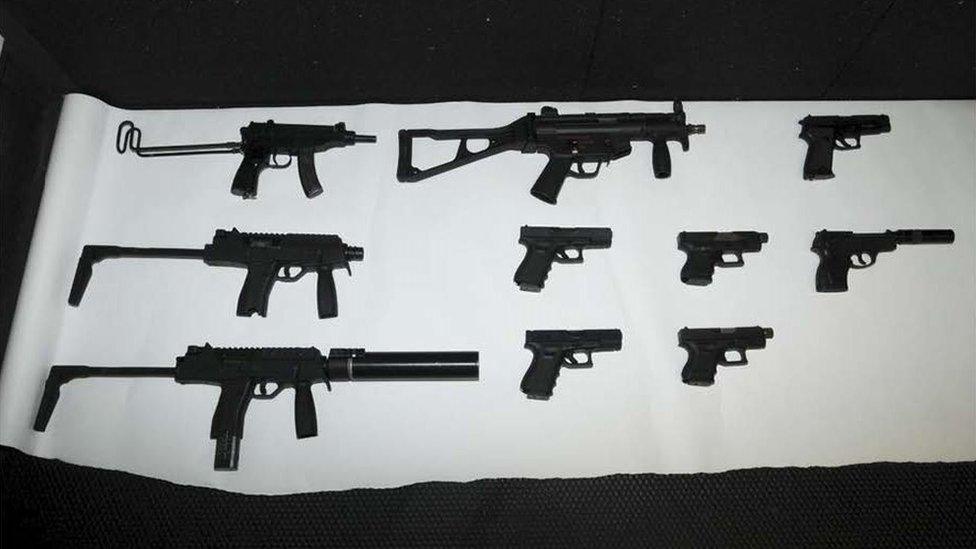Crime gang snared by hidden DNA on torture gun
- Published
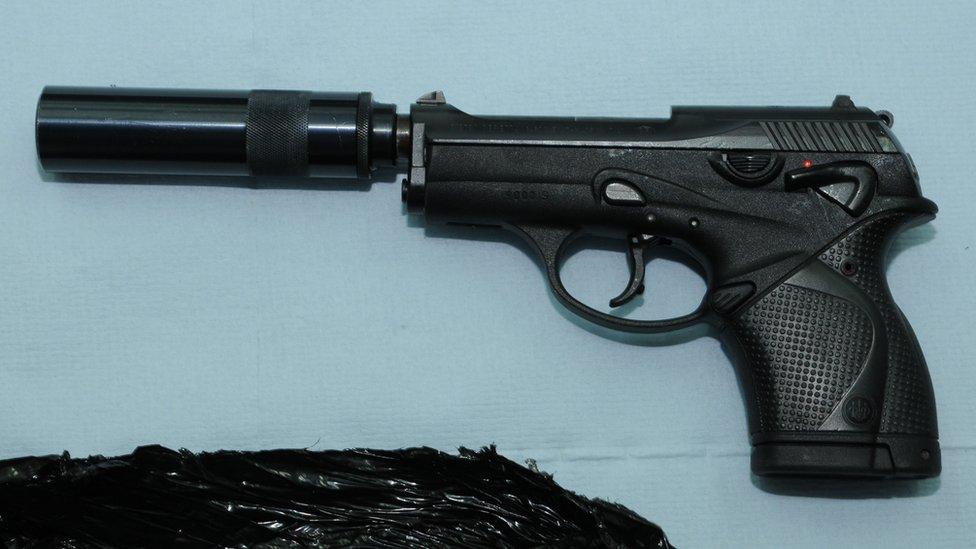
The Beretta 9000 pistol, fitted with a silencer, that was used to torture Robert Allan
A pioneering forensic technique, developed in Scotland, helped bring one of Britain's most sophisticated crime gangs to justice.
Nine men will be sentenced next month for importing drugs and trafficking firearms on an industrial scale.
The group had an annual turnover of more than £100m and had links across Britain and Europe.
And they went to elaborate lengths, including using anti-surveillance equipment, to evade detection.
Members even travelled to Brazil and met drug cartels to arrange high-purity cocaine shipments to the UK, via West Africa.
Now BBC Scotland can reveal exactly how the DNA of a drug dealer was recovered from a gun used to torture him.
The High Court in Glasgow heard Robert Allan was kidnapped by David Sell and two armed men in March 2015 after fleeing Scotland for Barnsley.
Allan, who had failed to pay a £30,000 debt, was driven to a desolate industrial unit in Fauldhouse, Midlothian.
Scrubbed clean
There he was lashed with a thick chain, struck with a metal bar and left with a broken leg after being beaten with a 14lb sledgehammer.
During his captivity he was also pistol-whipped with a Beretta 9000, fitted with a silencer.
Almost two years later it was among a haul of weapons recovered from a lock-up in Anniesland, Glasgow.
The semi-automatic gun, which had been scrubbed clean, was hidden in a specially-engineered compartment of a Honda CRV.
At the time, Police Scotland was running four major investigations into serious and organised crime.
But the firearms consignment proved they were all connected and Operation Escalade was launched.
The gang took meticulous steps to cover their tracks - but it was the use of an innovative technique which led to their downfall.
When the gun reached the Scottish Crime Campus in Gartcosh, North Lanarkshire, it was completely dismantled.
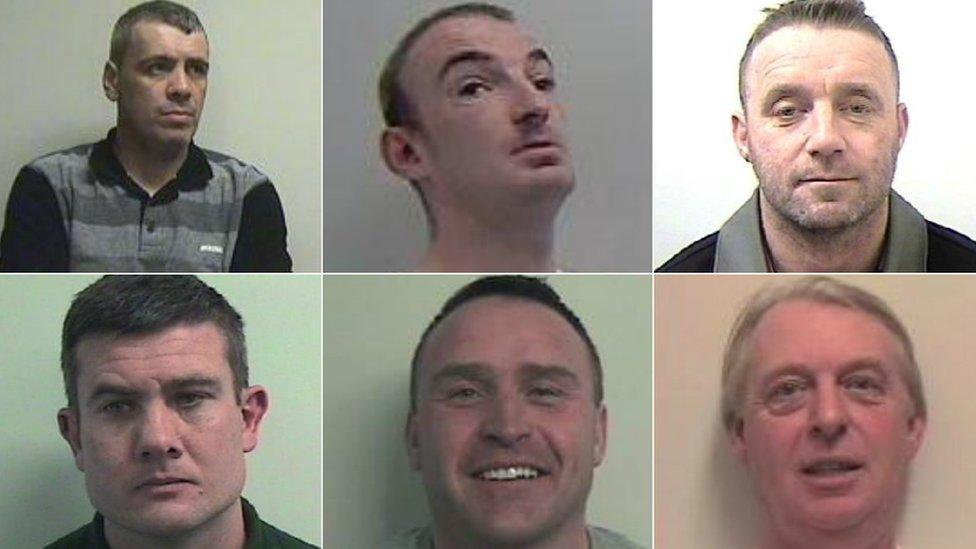
Clockwise from top left: Gerard Docherty, Steven McCardle, Francis Mulligan, David Sell, Barry O'Neill and Martyn Fitzsimmons.
Experts in the firearms forensics lab recovered Allan's DNA from blood which had seeped into the grip, chamber and magazine.
More than a decade ago scientists simply swabbed the surface of a weapon in a bid to obtain a forensic sample.
That was until a leading ballistics expert, who wishes to remain anonymous, decided to start taking firearms apart to test them.
By stripping weapons down to their components he was able to trace and test microscopic particles, from skin to sweat, which were previously hidden.
The technique was revolutionary and has now been adopted by law enforcement agencies across the world.
'Groundbreaking work'
A police source said: "This was a crucial pillar of the investigation as it linked David Sell to the crime group.
"The forensic team do not get enough credit but without their groundbreaking work we may never have been able to put the gang behind bars."
After attempting to recover DNA from a weapon, its characteristics are noted, such as make, model and calibre.
Every gun that arrives at Gartcosh is also test-fired to measure the speed of a bullet, and estimate how far it will travel and when it will hit the ground.
The data is then put into the National Ballistics Intelligence Service (NABIS) database and compared with incidents in the UK.
That enables detectives to build up a picture of who is using a weapon and the gang that has control over it.
Its movements can also be mapped and, crucially, it can be linked with other crimes.
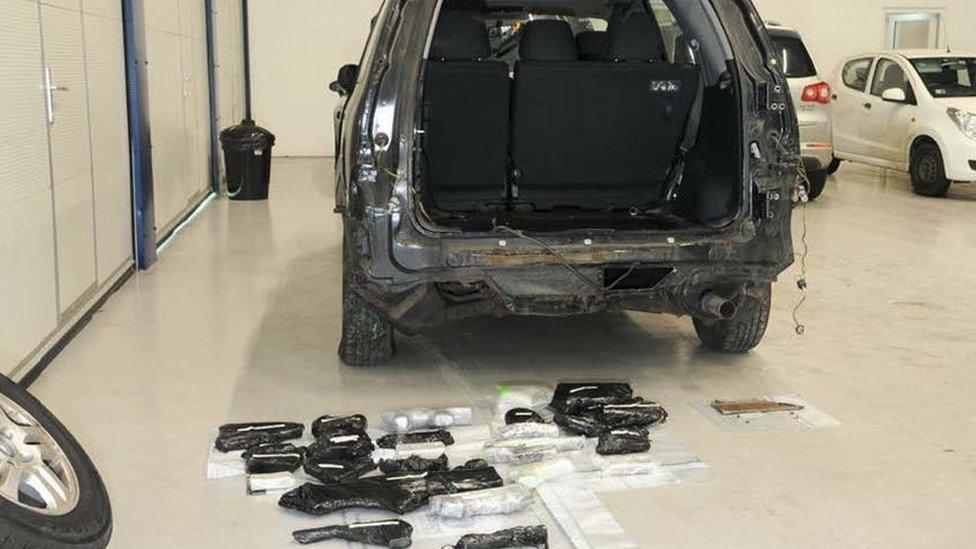
The Beretta pistol was among a haul of firearms, ammunition and a grenade which were discovered in a concealed compartment in the back of a Honda CRV
The guns seized from the gang are believed to have been sourced on the continent and are similar to weapons recently recovered in France and Dublin.
One, a Sig Sauer pistol, was stolen during a housebreaking in Switzerland.
None of them has yet been linked to any shootings in the UK but many have had replacement barrels fitted to give them a different ballistic signature from the original weapon.
That means, in theory, they could have been used before the barrels were replaced.
BBC Scotland understands the gang had criminal links across the UK and in Spain, Portugal, Belgium and Holland.
Their cocaine operation was industrial in its scale, generating an estimated £2m a week, and global in its scope.
With the wholesalers now facing lengthy jail terms, the next phase of Operation Escalade will focus on the Godfathers who masterminded one of Scotland's most audacious criminal enterprises.
- Published11 December 2017
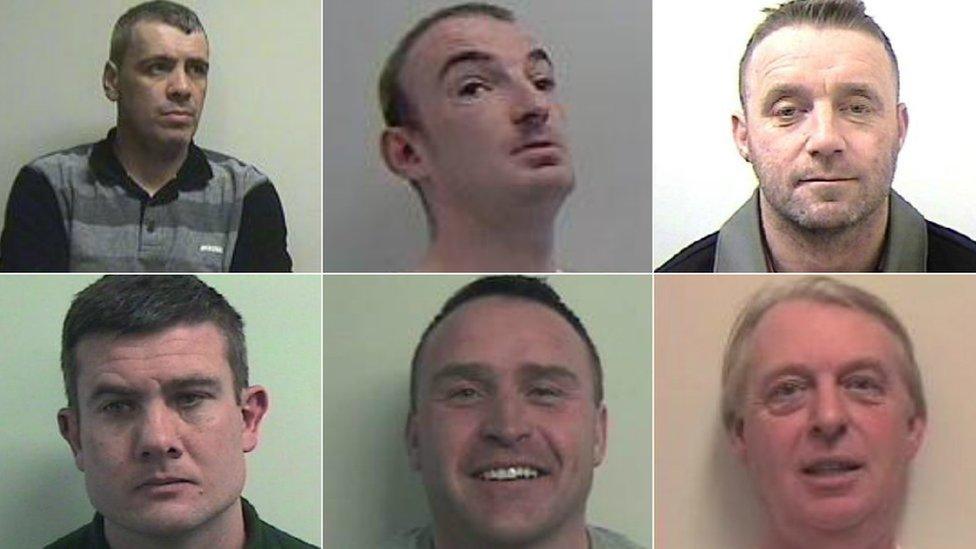
- Published11 December 2017
